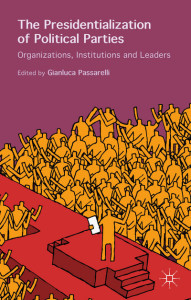on Political Studies Review (by Maximilien Cogels, University of Louvaine)
 While the study of presidentialisation is often combined with the concept of personalisation, Gianluca Passarelli decides to make a clear conceptual distinction between the two, focussing on the already highly debated study of the presidentialisation of politics. By starting with the premise that under certain circumstances presidentialisation is also possible in non-presidential systems (this is highly contested between scholars), this book takes a closer look at the presidentialisation of political parties in the world, advocating that the presidentialisation of politics stems from the behaviour of political parties. This collaborative book considers that political parties are the driving force behind the phenomenon. The authors study in this book the constitutional structures (opportunities and constraints) that affect presidentialisation while including party genetics (and their organisational changes over time) as an intervening factor. This is an original approach given the fact that these two dimensions are often studied separately. Indeed, the book is innovative in regard to two crucial points, the first being the study of these two dimensions together, and the second being its method of bringing together all types of democratic regimes. Leggi tutto “NEW Book Review: The Presidentialization of Political Parties”
While the study of presidentialisation is often combined with the concept of personalisation, Gianluca Passarelli decides to make a clear conceptual distinction between the two, focussing on the already highly debated study of the presidentialisation of politics. By starting with the premise that under certain circumstances presidentialisation is also possible in non-presidential systems (this is highly contested between scholars), this book takes a closer look at the presidentialisation of political parties in the world, advocating that the presidentialisation of politics stems from the behaviour of political parties. This collaborative book considers that political parties are the driving force behind the phenomenon. The authors study in this book the constitutional structures (opportunities and constraints) that affect presidentialisation while including party genetics (and their organisational changes over time) as an intervening factor. This is an original approach given the fact that these two dimensions are often studied separately. Indeed, the book is innovative in regard to two crucial points, the first being the study of these two dimensions together, and the second being its method of bringing together all types of democratic regimes. Leggi tutto “NEW Book Review: The Presidentialization of Political Parties”


